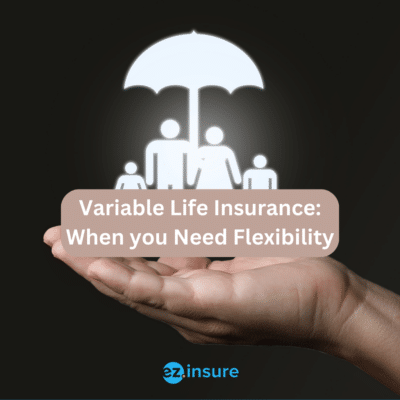
What is Variable Life Insurance?
Variable life insurance is a whole life policy that protects you for the rest of your life. As long as you keep your premium payments up to date. Every variable life insurance policy is made up of 3 components: the death benefits, the premium, and the cash value. The premiums are your monthly payments you make to keep your policy active. The premium goes toward the cost of insurance and fees then the rest goes toward your policy’s cash value. The cash value is a tax-deferred savings account where you can invest in different mutual funds. You have the freedom to keep an eye on your money and decide what gets invested where.
If your cash value investments do well, you can use it to increase your death benefit. Or cash some of it out as you need it. It’s important to know that with investments there also comes the possibility that the investment won’t do well and you can lose money. When you die, the death benefit is the amount of money your beneficiaries get.
Cash Value

Variable life insurance gives you more ways to make money than other cash value life insurance plans, like whole life insurance, because you can choose how to invest your money. With that being said, variable life insurance plans rarely have a promised return rate. Because the performance of your investment market directly affects your cash value. Meaning in a good year your account will earn a healthy return on investment. But in a bad year you’re risking losing money. Additionally, most insurance companies will put a limit on how much your investment can earn, so you can’t make as much as you would with an independent savings investment.
Death Benefit
Most of the time, variable life insurance death benefits are paid out in one of two ways:
- Level death benefit – This means the death benefit will be equal to the face value when you buy the plan.
- Face amount plus cash value – This structure costs more, but your beneficiaries will get the face value of your death benefit as well as whatever is in your cash value account.
Some policies do offer other types of benefit structures like paying out the face value plus all of the premiums paid. But the two listed are the most popular. The death benefit is basically a goal based on an assumption about how well the cash value will do, like a 4% annual rate of return. If this rate of return holds, the insurer assumes the cash value will equal the face value of the insurance you pass away. However, if the cash value doesn’t go well, it can actually reduce your benefit based on the terms of your policy. No matter how your death benefit is set up, you should always check the policy terms to make sure the death benefit is guaranteed. If it is, make sure the expected value and the guaranteed value.
Variable Universal Life Insurance
Variable universal life insurance works just like a regular variable life insurance policy. However it comes with extra flexibility. With variable universal policies you get the option to put your cash value towards your premium. Meaning if your investments do well and you have enough in your cash value account the policy will essentially pay for itself. When you pay your premium you can choose to pay more or less than the normal premium out of pocket. Giving these policies the nickname “flexible premium policies”. Even though most variable universal life insurance plans do have a minimum and maximum premium limit, you can pay any amount between the limits. So, you can:

- Pay a portion – If your monthly payment is $500, you can choose to pay $250 out of pocket and use your cash value to pay the other half. Keep in mind that you can only do this if you have a certain amount saved in your cash value amount.
- Pay nothing – When your cash value has enough money in it, you can put it entirely towards your premium payment.
- Pay more – If you want to get to the pay nothing section quicker then early on you can put more than the premium amount in so the cash value and investments build up quickly. This is often the best choice if you have a large income and want to be able to stop paying fees in the future like when you retire.
Single Premium Variable Universal Life Insurance
We know the policy names are getting long, stick with us, we’ll explain. These plans let you buy coverage and add to the cash value of your policy in one payment. You buy coverage and make all of the minimum cash value contributions at the same time. It’s a hefty chunk of change. But in that single payment you’re fully funding your policy and automatically guaranteeing a large death benefit. Single-premium life insurance plans are also helpful because they let you pay for long-term care with policy loans or by adding a rider. Some single-premium life insurance policies let the policyholder withdraw money from the death benefit tax free to pay for living expenses.
Single-premium whole life and single-premium variable life are two of the most in-demand single-premium policies. How each program builds up a cash value is different. The first one has a set interest rate with no risk. The second option invests the cash value in carefully managed portfolios. Which comes with the risks and possible rewards of active investing.
Variable Life Insurance VS. Whole Life
Both variable and whole life insurance covers you for your whole life. But whole life insurance is less risky and pays out less. Whole life insurance has the following:
- Fixed premiums – You pay the same premium every month.
- Level death benefit – The death benefit will not lose value, it is guaranteed and remains the same.
- Guaranteed returns – Your cash value will keep going up. And when the insurance matures, it will usually be guaranteed to be equal to the death benefit.
- Fixed growth potential – There is no room for your investment returns to be higher.
Variable life insurance plans can make the cash value grow much faster. And in some cases, the cash value can even be used to pay the premiums. These plans have more flexible premiums than whole life insurance policies.
Variable Life Insurance VS. Term Life
If you have monetary obligations that aren’t likely to go away in the next 20 to 30 years. Term life insurance is likely a better choice than variable life insurance because it costs a lot less. For example, if you want to make sure your family can stay in your home if you die and you have a 15-year debt, term life insurance would be a better choice. In the same way, if you think you can save enough money over the next 20 years to take care of any future financial responsibilities, you should just buy term insurance as a backup. You would have to pay more for variable life insurance if you wanted a death payment for the rest of your life.
Working With EZ
Even though this type of policy has some risks. It is the best way to invest in life insurance for the long run. Variable life insurance is a good choice for people who want a permanent life insurance policy that lets them build up cash value. Or people who want control over their investment options and the freedom to choose where to put their money. However, it is only for people who have enough money to pay the premiums for the rest of their lives. Even though there are more risks with this type of insurance, it could be worth it if you can afford it.
However, if you want cheaper coverage with more of a guarantee. You might be better off with a term life insurance policy because the premiums are cheaper. And you can convert it into a permanent life insurance policy. Working with an agent who specializes in life insurance is the best way to find the right policy for you and your needs. Everyone has their own needs, goals, and ways they can spend their money. At EZ.Insure, we know that you and your family want the best security. But we also know you have to stay within your means.
So, we will do everything we can to find you the best policy at the best price. We want to make it as easy as possible for you to do so and the best part is that everything we do is free! EZ will help you with everything. From answering all of your questions to helping you choose a policy and finish the registration process. We will also help you after your plan has been implemented. To get started, just type your zip code into the bar below or give us a call at 877-670-3560.